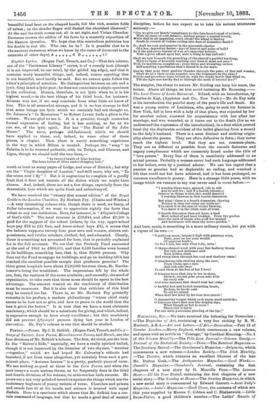POETRY.—Poems. By J. B. Selkirk. (Kegan Paul, Trench, and Co.)—
Songs of Yarrow, Love Poems, Miscellaneous Poems, and Marah, are the four divisions of Mr. Selkirk's volume. The first, we think, are the best. In the " Reiver's Ride," especially, we have a really spirited ballad, though it is not improved by the iteration of two rhymes, " weather —together," which we bad hoped Mr. Calverley's ridicule had banished, if not from verse altogether, yet certainly from such a pro- minent place. "Autumn Leaves" is a pretty, pathetic piece of verse. We see nothing as good as these in the Love Poems, and when the poet essays a more serious theme, as he frequently does in the third and fourth divisions of his volume, he achieves but little success. He pours out a not very polished invective against the things which are the customary bugbears of young writers of verse. Churches and priests and creeds fare ill at his hands, and science is treated with equal disdain. Here is a specimen which shows that Mr. Selkirk has a cer- tain command of language, but that he needs a good deal of mental
discipline, before he can expect us to take his serious utterances seriously :—
" Can we give our hearts' compliance to this fate-bound creed of science, With its sneer of cold defiance, holding prayer a wasted breath, While deaf to all appealing, every. stroke the wheel is dealing
Sends its crowds of victims reeling into dust of dreamless death ?
Or, shall we seek soul-quarter in the miserable charter Of a low, degrading barter—joys of heaven and pains of hell? As if the god•given banner of a m in's immortal honour, With a price affixed upon her, were a thing to buy and sell !
Shall we bow beneath the preaching of the church's garbled teaching,
With its farce of heavenly reaching over lines it must not pass ? With its multiform complexion ; every fierce and wrangling section Self-asserting a perfection that's denied it in the mass.
Quacks that pour their paid-for thunder through the gates of fear and wonder,
Shall we tear their creeds asunder, toss the fragments to the skies ? Priests and preachers leave behind us, with the windy words that blind ns, Till the light can hardly find as through the mesh of twisted lies ?"
The simpler, the closer to nature Mr. Stirling can keep his muse, the better. Above all things, let him avoid imitating Mr. Browning.— The Love Poems of Louis Barnaval. Edited, with an Introduction, by Charles de Kay, (Appleton and Co., New York.)—Mr. de Kay tells in his introduction the painful story of the poet's life and death. He was a young native of Louisiana, who, going to seek his fortune in New York, fell in love with a lady of that place, was rejected by her for another suitor, renewed his acquaintance with her after her marriage, and was wounded, as it turns out to the death (for so we understand the expression of the introduction), in a duel which proved fatal (by the deplorable accident of the bullet glancing from a stone) to the lady's husband. There is a most distinct and striking origin- ality about the poems. They are often defective in form ; they never reach the highest level. But they are not common-place. They are as different as possible from the smooth flatteries and sugary compliments which are commonly found under the title of " love poems." Every line of them is manifestly addressed to an actual person. Probably a woman never had such language addressed to her before, even by a poetical adorer. We can but regret that a passion so genuine had so deplorable an ending, and wrecked a life that could not but have achieved, had it but been prolonged, no common excellence in poetry. Here is a strange little poem, with an image which we venture to say was never used in verse before :-
" I worship three ways, upward, tide to side And to and fro ; and if a fourth extension Inheres in things within this world descried I worship likewise in that fourth dimension.
But what! there is a fourth dimension, showing Neither in lines nor cubes nor surfaces ! You catch it in the eyes of violets blowing, You know it in the silent souls of trees.
0 fourth dimension thou art Love. a land
Most talked of and least trodden. From thy garden Circe the ruck of beasts who scoff has banned And nevermore will these thy lovers pardon."
And here, again, is something in a more ordinary Strain, bat yet with a vigour of its own :—
" 0 gold-cup moon, brimm'd high with generous wine, Pour, pour on her your wealth Of amorous health, On her I call, but with what folly, mine !
0 thyme•steeped wind, with your fine feathery broom For rare new perfumes seek Each hidden creek And sweep them through her cool and shadowy room!
0 treacherous tide swirling along the cove,
From China spices rare And rich silks bear
To cast them at the feet of her I love!
0 fringing trees that sing to her in sleep, Stretch, stretch your green nets wide On every side
And seize miasmas that should near her creep!
O bashful feet and foolish trembling hands, Be firm, he hardy each To aid his speech When next her lover by his true love stands !
O stammering tongue which each warm word outstrip!, 0 timorous heart that now like dolphin dips, What though ye fail to serve ?
There still is nerve For one mute passionate pleading of the lips."


































 Previous page
Previous page